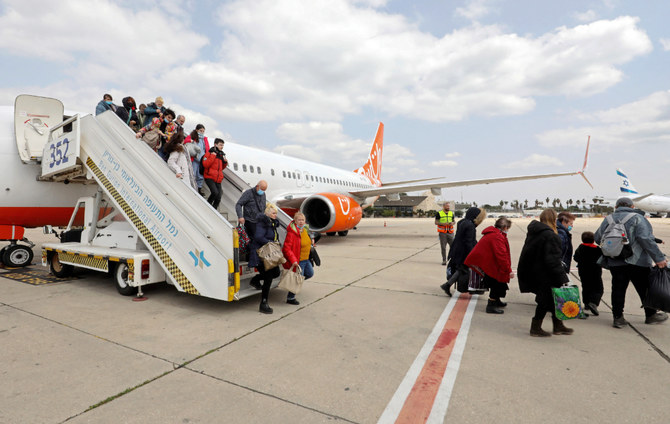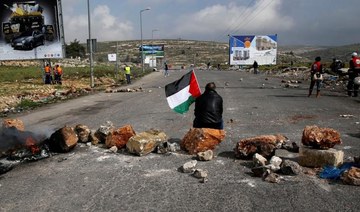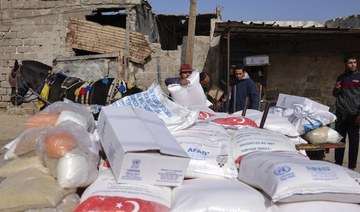RAMALLAH: Concerns have increased in Israel since the outbreak of war in Ukraine over claims in the media that some women refugees from the Eastern European country were being exploited by human trafficking networks.
Leaflets — including preventive information and emergency phone numbers — are expected to be distributed among Ukrainian refugee women upon arrival at the airport as part of measures to counter the threat.
A moral dilemma has arisen — as Israel has begun to receive hundreds of Ukrainians fleeing war — amid fears that some of the arriving women were being lured into prostitution, according to Israeli media reports.
The reports detailed how Israeli human trafficking and criminal networks lure Ukrainian refugees into prostitution upon their arrival to Israel, with the concern being used as an excuse for Israeli immigration officials to deny entry to dozens of refugees during the past two weeks.
According to a TV report aired on Thursday on Israeli Channel 12, the Israeli Ministry of Social Welfare and the Anti-Trafficking Unit in the Ministry of Justice received information on attempts to lure Ukrainian female refugees in Israel into prostitution.
The attempts to lure refugee women did not begin only after arriving in Israel.
The report indicated that about 100 Ukrainian refugees spoke during their interrogation at Ben Gurion Airport about a person who offered them money to help them escape from the war zones in Ukraine, cross the border and board a plane bound for Israel.
The refugee women added that after they arrived in Israel, the same person told them that they had to provide “sexual or domestic services” to pay back the money.
The Israeli Population and Immigration Authority has received information and details on the person in question, and the suspicion is that a network — rather than a single person — was trying to lure refugee women into prostitution.
FASTFACT
247 Ukrainians were refused entry out of the nearly 10,000 refugees who have tried to enter Israel since the outbreak of the war three weeks ago.
The testimonies of refugee women will be communicated to the police to open an investigation.
During deliberations in the Knesset on March 14, Population and Immigration Authority Director-General Tomir Moskowitz justified his refusal to allow some Ukrainian refugees to enter Israel, claiming that “they have come to work (in) prostitution.”
Moskowitz said: “Just as they came before the war, they come now too. Some of them are victims of (human trafficking) … and some are interested in bringing them or inviting them here.”
According to data reviewed by Moskowitz, 247 Ukrainian refugees were refused entry out of the nearly 10,000 refugees who have tried to enter Israel since the outbreak of the war in Ukraine three weeks ago.
Luring Ukrainian and Russian immigrant women into prostitution is not a new issue in Israel.
Dozens of those who immigrated to Israel in the early 1990s following the collapse of the former Soviet Union were reportedly recruited to work in prostitution for years.
Meanwhile, an Israeli source related to the institutes receiving Ukrainian immigrant women confirmed to Arab News that human trafficking was indeed occurring, adding that this was the case not only in Israel but in Europe as well.
“I heard that someone came to those Ukrainian women and gave them a telephone number. Yes, it happened,” said the source, who requested anonymity.

























